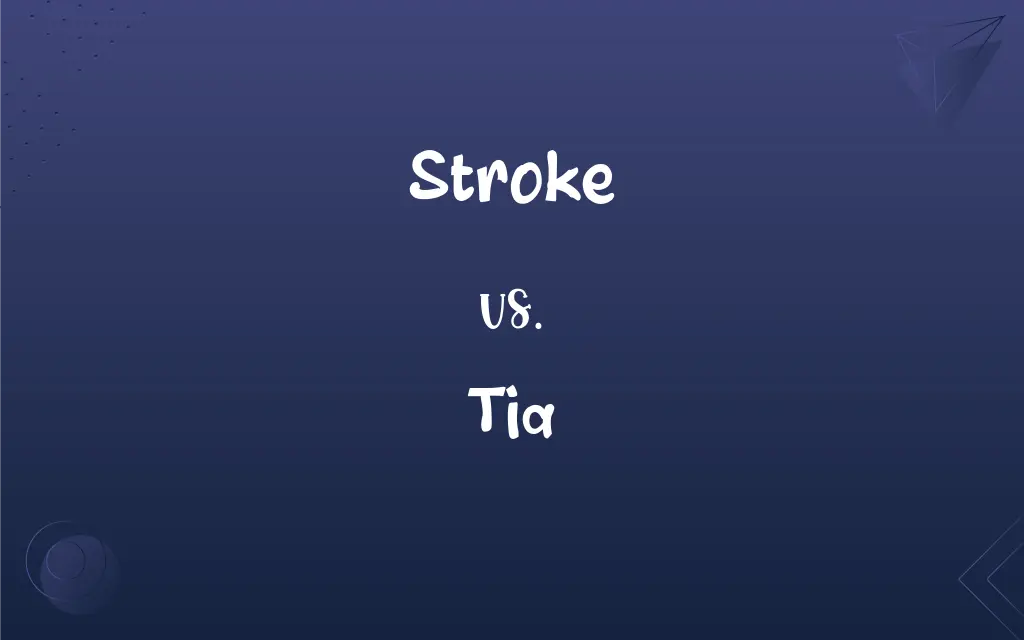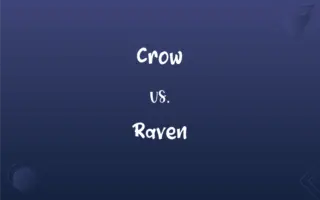Stroke vs. Tia: What's the Difference?
Edited by Janet White || By Harlon Moss || Updated on October 12, 2023
Stroke involves a sudden stop of blood flow to part of the brain, causing permanent damage, whereas TIA (Transient Ischemic Attack) is a temporary blockage, often called a mini-stroke, causing no lasting damage.

Key Differences
A stroke signifies a medical emergency marked by a sudden cessation of blood flow to a part of the brain. The nature of a stroke is such that it causes an abrupt onset of symptoms, which may include difficulty speaking, paralysis on one side of the body, and sudden, severe headaches. A stroke requires immediate medical attention to mitigate the potential for substantial neurological damage or other complications.
Conversely, a Transient Ischemic Attack (TIA) shares symptomatic similarities with a stroke but differentiates itself by not causing permanent damage. Recognizable through abrupt disruptions in speech or visual disturbances, TIAs typically last only a few minutes. Immediate medical attention remains crucial to ensure that it is, in fact, a TIA and not a full-blown stroke, which may require different intervention.
A stroke's aftermath often necessitates ongoing management and therapy due to its potentially debilitating effects. Subsequent to a stroke, individuals might undergo physical therapy, occupational therapy, or speech therapy to manage and possibly regain lost function. The recovery journey post-stroke can be varied, largely dependent on the stroke's severity and the brain area affected.
Conversely, after a TIA, individuals might not have lasting physical implications, but a TIA is frequently a warning sign. It foretells the potential for a future stroke and thus becomes a pivotal point for intervention in reducing stroke risk. This might involve managing risk factors, such as hypertension or implementing lifestyle changes to improve overall vascular health.
Ultimately, both stroke and TIA are serious medical events that necessitate timely intervention and management. Although they may present similarly, their long-term implications diverge significantly, underlining the necessity for thorough medical evaluation and appropriate subsequent management to safeguard ongoing neurological health.
ADVERTISEMENT
Comparison Chart
Duration of Symptoms
Persistent and could lead to permanent disability.
Symptoms resolve completely, typically within a few minutes to 24 hours.
Damage
Can cause permanent brain damage.
Does not cause permanent damage.
Risk of Recurrence
Can reoccur but is often a singular event.
Often serves as a warning sign for potential future stroke.
Treatment
May involve clot-busting drugs, physical therapy, and potential long-term care.
Evaluation to determine the cause, preventive strategies, and potential medications for management.
Impact on Lifestyle
May necessitate substantial lifestyle and possibly living condition alterations post-event.
May necessitate lifestyle changes to reduce future stroke risk but no lasting impairment.
ADVERTISEMENT
Stroke and Tia Definitions
Stroke
A stroke can result in persistent neurological damage, affecting speech, movement, and cognitive abilities.
The stroke left him with aphasia, impacting his ability to communicate effectively.
Tia
A Transient Ischemic Attack (TIA) is a brief episode of neurological dysfunction caused by loss of blood flow.
The doctor explained that a TIA often serves as a warning sign for a potential future stroke.
Stroke
A stroke is a sudden interruption in the blood supply to the brain.
After experiencing a stroke, she had to undergo intensive physical therapy.
Tia
The causes of a TIA can include a small blood clot or arterial stenosis.
Following her TIA, she underwent tests to determine the extent of her arterial stenosis.
Stroke
Strokes are classified into ischemic, caused by blockages or clots, and hemorrhagic, caused by bleeds.
Ischemic strokes are often associated with conditions like atrial fibrillation.
Tia
TIA, often called a mini-stroke, presents similar symptoms to a stroke but without lasting damage.
She was relieved to learn that her symptoms were from a TIA, not a full stroke.
Stroke
Recognizing a stroke involves noting abrupt onset of facial drooping, arm weakness, and speech difficulties.
The FAST (Face, Arms, Speech, Time) acronym is widely utilized to help remember the signs of a stroke.
Tia
After a TIA, doctors often recommend lifestyle changes to mitigate stroke risk.
Lifestyle modifications, such as dietary changes, were pivotal after his TIA to prevent a full stroke.
Stroke
Post-stroke rehabilitation and management are pivotal for optimizing recovery and preventing subsequent strokes.
Engaging in stroke rehabilitation can significantly enhance quality of life and functional outcomes post-event.
Tia
TIA usually lasts only a few minutes and generally no more than 24 hours.
His TIA lasted approximately 15 minutes, during which he experienced temporary vision impairment.
Stroke
The act or an instance of striking, as with the hand, a weapon, or a tool; a blow or impact.
Tia
Initialism of [[w:Telecommunications Industry Association
Stroke
The striking of a bell or gong.
Tia
Initialism of [[w:This Is Africa, a business newspaper.
Tia
(medicine) transient ischemic attack
Tia
Brief episode in which the brain gets insufficient blood supply; symptoms depend on the site of the blockage
FAQs
What are common symptoms of a stroke?
Common symptoms include facial weakness, arm weakness, and speech difficulty.
Can a TIA be a warning sign for a future stroke?
Yes, a TIA often acts as a warning for future strokes and warrants preventive measures.
How quickly should someone seek help if they suspect a stroke?
Immediately. Time is critical in stroke management to minimize potential damage.
What is a stroke?
A stroke is a medical emergency where blood flow to part of the brain is cut off, causing potential permanent damage.
What lifestyle changes are recommended after a TIA?
Often recommended are modifications like adopting a healthier diet, exercising, and quitting smoking.
How is a stroke different from a TIA?
A stroke causes permanent brain damage, while a TIA doesn’t leave lasting damage and symptoms resolve quickly.
Are TIAs serious if they don’t cause permanent damage?
Yes, TIAs are serious as they often indicate underlying issues that could lead to a full stroke.
Can younger people experience a stroke or TIA?
Yes, while risk increases with age, younger individuals can experience strokes and TIAs.
Can a person have more than one TIA?
Yes, individuals can experience multiple TIAs, often signaling high stroke risk.
How is quality of life after a stroke?
Varies widely, with factors including the stroke’s severity and timely treatment determining outcomes and potential for recovery.
How can one prevent a stroke after a TIA?
Lifestyle changes, managing risk factors, and sometimes medication are used to prevent a subsequent stroke.
Are there different types of TIA?
No, but TIAs can have different causes, such as small clots or arterial narrowing.
What is an ischemic stroke?
An ischemic stroke occurs when a blood clot obstructs a vessel supplying blood to the brain.
What is a hemorrhagic stroke?
A hemorrhagic stroke involves a blood vessel bursting in the brain, causing bleeding.
How is a TIA diagnosed?
Through a physical exam, considering symptoms and further investigations like imaging studies.
Are strokes and TIAs hereditary?
While having a family history can increase risk, lifestyle and medical management remain pivotal in risk management.
What does TIA stand for?
TIA stands for Transient Ischemic Attack.
What are risk factors for stroke?
High blood pressure, smoking, diabetes, and high cholesterol are major risk factors for stroke.
How is a stroke treated?
Treatment can involve medication like thrombolytics, surgery, or other interventions based on the cause and type of stroke.
Is recovery possible after a stroke?
Yes, many people experience significant recovery after a stroke, often involving rehabilitation therapies.
About Author
Written by
Harlon MossHarlon is a seasoned quality moderator and accomplished content writer for Difference Wiki. An alumnus of the prestigious University of California, he earned his degree in Computer Science. Leveraging his academic background, Harlon brings a meticulous and informed perspective to his work, ensuring content accuracy and excellence.
Edited by
Janet WhiteJanet White has been an esteemed writer and blogger for Difference Wiki. Holding a Master's degree in Science and Medical Journalism from the prestigious Boston University, she has consistently demonstrated her expertise and passion for her field. When she's not immersed in her work, Janet relishes her time exercising, delving into a good book, and cherishing moments with friends and family.































































